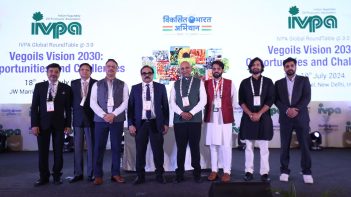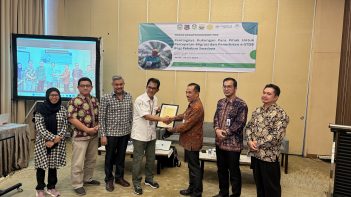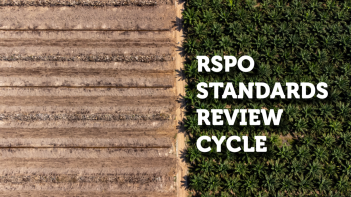Kuala Lumpur, Malaysia, 29 June 2012 – The Roundtable on Sustainable Palm Oil (RSPO), the multi-stakeholder initiative that aims to promote the growth and use of sustainable palm oil, introduced its Trademark to the market a year ago. To date, 61 RSPO Trademark licenses across 13 countries have been issued.
RSPO certification at the plantation level and the Trademark on the end product completes the loop from upstream to downstream within the supply chain and will reflect that sustainable oil palm cultivation does not contribute to the sustained destruction of valuable tropical forests or damage the interests of people in the regions where the palms are grown. Producers of household products such as margarine, cookies, chocolate, soap and cosmetics are able to clearly show their commitment to sustainable palm oil through the use of this Trademark.
Palm oil is gaining increasing importance in the global economy because of its high yield and versatile application in a range of products from food to personal care to biofuels. RSPO members are conscious that growing global demand creates risks for the protection of natural habitats and local communities in producing countries. For this reason they are actively engaged in increasing the sustainability of palm oil production worldwide. The RSPO Trademark brings greater visibility to the efforts of the RSPO supply chain members in consumer markets.
RSPO growers have been making tremendous progress over the past years. The commitment to sustainable palm oil from growers is showcased by New Britain Oils Ltd (NBOL) which has recently launched its first certified sustainable frying oil ‘New Britain Finest’ for the foodservice industry carrying the RSPO Trademark. Andy Worrall, General Manager for NBOL said: “Our recent UK expansion into packed products for the foodservice and bakery sectors is part of our on-going commitment to making sustainable palm based products the affordable and natural choice for everyone in the market. We decided to use the RSPO Trademark on our packaging, to help raise awareness, improve product transparency and give buyers the opportunity to make an informed purchasing decision. We hope this move will encourage other companies to follow suit and drive further market conversion to sustainable palm.”
Further down the supply chain, processors and traders take care of ensuring the flow of sustainable palm oil through the supply chain. Chris Holmes, Sales Representative at Stephenson Group – one of the world’s leading speciality soap base manufacturers: “Since joining RSPO, Stephenson Group set out with the objective of promoting the growth, use, and awareness of RSPO CSPO within the Personal Care industry. As a soap base supplier, our products do not carry the Trademark however, we established and have played a key role in developing a segregated supply chain in order to support, promote and allow the Trademark to be used on-pack by our downstream customers worldwide. In our view, the RSPO Trademark is vital, not only to illustrate support for RSPO, smallholders, and the supply chain, but crucially to raise consumer awareness in-store, and provide the market with the understanding required to make the right choice.”
The Trademark bridges the gap between the upstream and downstream sustainable palm oil production and distribution system. Barbara Devine, Director of Marketing for Twincraft Soap, a private label bar soap manufacturer: “Twincraft is a proud member of RSPO. We believe in their mission and are pleased to offer our customers sustainably harvested soap base options. Our market continues to evolve and we want to continue to be the bar soap manufacturer of choice for all of our customers. Offering RSPO certified base provides brands the ability to demonstrate their commitment to sustainability, raise awareness and promote product transparency while giving consumer’s confidence in their purchasing decisions.”
For product manufacturers the Trademark represents a seal of commitment to responsibly protect the environment, social causes, and wildlife conservations. Reed Doyle, Director Global Strategic Sourcing at Seventh Generation: “As members of the RSPO, we’ve deepened our understanding of the ecological and social dimensions of our palm oil derivatives. Seventh Generation made a commitment in early 2009 to source RSPO-certified sustainable palm kernel for our cleaning products and we were the first household and personal care company in North America to purchase Green Palm certificates equivalent to our annual company-wide use. As our volumes continue to grow and we expand into new product categories such as personal care products, we plan to evolve our strategy and move up to the most direct type of sourcing – Segregation and/ or Identity Preservation. Seventh Generation has always sought to lead our industry further down the path of sustainability, which is why we are featuring the RSPO Trademark on the packaging for our new bar soap. As important as companies choosing to source CSPO is ensuring that consumers have the tools to make informed decisions about the products they buy. The RSPO seal allows consumers to know which companies are sourcing palm oil in a more responsible and sustainable way. This combination of companies willing to lead, and consumers demanding change, has the potential to make the world a much more sustainable place.”
RSPO aims to further increase the adoption of the RSPO Trademark. Darrel Webber, Secretary General of the RSPO, “The entire sustainable palm oil supply chain benefits tremendously from the adoption of the RSPO Trademark as the increase in uptake of CSPO naturally leads to a higher demand for CSPO. We see the Trademark as the ultimate vehicle to bring the subject of sustainable palm oil closer to consumers, boost demand of CSPO and encourage market uptake.”
The first products with the Trademark arrived at the stores during the first year of the Trademark’s existence. This step marks the entry of the RSPO Trademark in the everyday life of many consumers around the globe as for the first time they will be able to consciously choose products which contain CSPO.
—END—
About RSPO
In response to the urgent and pressing global call for sustainably produced palm oil, the Roundtable on Sustainable Palm Oil (RSPO) was formed in 2004 with the objective of promoting the growth and use of sustainable oil palm products through credible global standards and engagement of stakeholders. The seat of the association is in Zurich, Switzerland, while the secretariat is currently based in Kuala Lumpur with a satellite office in Jakarta.
RSPO is a not-for-profit association that unites stakeholders from seven sectors of the palm oil industry – oil palm producers, palm oil processors or traders, consumer goods manufacturers, retailers, banks and investors, environmental or nature conservation NGOs and social or developmental NGOs – to develop and implement global standards for sustainable palm oil.
Such multi-stakeholder representation is mirrored in the governance structure of RSPO such that seats in the Executive Board and project level Working Groups are fairly allocated to each sector. In this way, RSPO lives out the philosophy of the "roundtable" by giving equal rights to each stakeholder group to bring group-specific agendas to the roundtable, facilitating traditionally adversarial stakeholders and business competitors to work together towards a common objective and making decisions by consensus.
For further information, kindly contact:
Contact for RSPO Secretariat:
Anne Gabriel, Communications Director | T:+603-22012053 | [email protected]
Contact for Europe:
Giovanni Colombo, Hill+Knowlton Strategies | T: +32 (0)2 231 50 19 | [email protected] ; [email protected]
Contact for Indonesia:
Desi Kusumadewi, RSPO Indonesia Director | T: +62 21 5794 0222 | [email protected]
Contact for India:
Arneeta Vasudeva, IPAN Hill & Knowlton | T: +91-124-4967316 | [email protected]
Contact for China:
Peter Headden, Hill & Knowlton | T: (86 10) 5861 7597 | [email protected]
Keep reading

Save the Date: The 21st General Assembly (GA21) of RSPO Members
Interim Measure for Requirements 5.1.5 and 5.1.6 of RSPO Rules on Market Communication and Claims 2022

RSPO Partners with Indian Vegetable Oil Producers’ Association (IVPA) to Promote Sustainable Cultivation and Palm Oil Imports in India
Call for Expression of Interest: Independent Investigation of a Complaint

2024 China Sustainable Palm Oil Forum Calls for Bold Action on Supply Chain Sustainability
Reminder: Important Updates on Shared Responsibility

Smallholder Inclusion in Indonesia: Over 1,000 Farmers Registered in RSPO Pilot Districts




